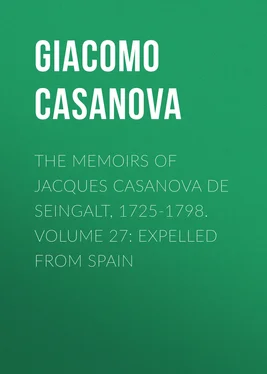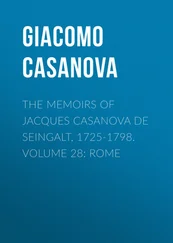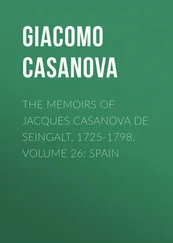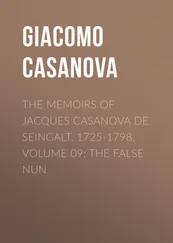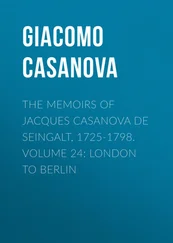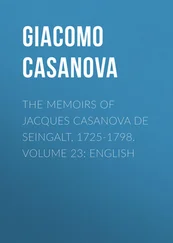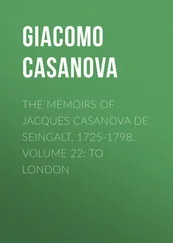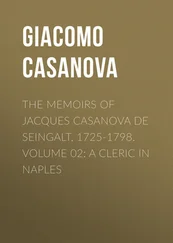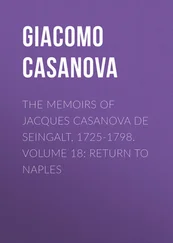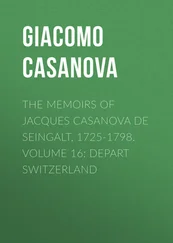Giacomo Casanova - The Memoirs of Jacques Casanova de Seingalt, 1725-1798. Volume 27 - Expelled from Spain
Здесь есть возможность читать онлайн «Giacomo Casanova - The Memoirs of Jacques Casanova de Seingalt, 1725-1798. Volume 27 - Expelled from Spain» — ознакомительный отрывок электронной книги совершенно бесплатно, а после прочтения отрывка купить полную версию. В некоторых случаях можно слушать аудио, скачать через торрент в формате fb2 и присутствует краткое содержание. Жанр: Биографии и Мемуары, История, foreign_edu, foreign_antique, foreign_prose, на английском языке. Описание произведения, (предисловие) а так же отзывы посетителей доступны на портале библиотеки ЛибКат.
- Название:The Memoirs of Jacques Casanova de Seingalt, 1725-1798. Volume 27: Expelled from Spain
- Автор:
- Жанр:
- Год:неизвестен
- ISBN:нет данных
- Рейтинг книги:3 / 5. Голосов: 1
-
Избранное:Добавить в избранное
- Отзывы:
-
Ваша оценка:
- 60
- 1
- 2
- 3
- 4
- 5
The Memoirs of Jacques Casanova de Seingalt, 1725-1798. Volume 27: Expelled from Spain: краткое содержание, описание и аннотация
Предлагаем к чтению аннотацию, описание, краткое содержание или предисловие (зависит от того, что написал сам автор книги «The Memoirs of Jacques Casanova de Seingalt, 1725-1798. Volume 27: Expelled from Spain»). Если вы не нашли необходимую информацию о книге — напишите в комментариях, мы постараемся отыскать её.
The Memoirs of Jacques Casanova de Seingalt, 1725-1798. Volume 27: Expelled from Spain — читать онлайн ознакомительный отрывок
Ниже представлен текст книги, разбитый по страницам. Система сохранения места последней прочитанной страницы, позволяет с удобством читать онлайн бесплатно книгу «The Memoirs of Jacques Casanova de Seingalt, 1725-1798. Volume 27: Expelled from Spain», без необходимости каждый раз заново искать на чём Вы остановились. Поставьте закладку, и сможете в любой момент перейти на страницу, на которой закончили чтение.
Интервал:
Закладка:
Donna Ignazia had more of my company than ever, and congratulated me on my freedom from the cares of business.
After the departure of Mocenigo I thought I would go and see if Querini, his nephew, was equally prejudiced against me. The porter told me that he had received orders not to admit me, and I laughed in the man's face.
Six or seven weeks after Manucci's departure I, too, left Madrid. I did so on compulsion, in spite of my love for Ignazia, for I had no longer hopes of doing anything in Portugal, and my purse was nearly exhausted.
I thought of selling a handsome repeater and a gold snuff-box so as to enable me to go to Marseilles, whence I thought of going to Constantinople and trying my fortune there without turning renegade. Doubtless, I should have found the plan unsuccessful, for I was attaining an age when Fortune flies. I had no reason, however, to complain of Fortune, for she had been lavish in her gifts to me, and I in my turn had always abused them.
In my state of distress the learned Abbe Pinzi introduced me to a Genoese bookseller, named Carrado, a thoroughly honest man, who seemed to have been created that the knavery of most of the Genoese might be pardoned. To him I brought my watch and snuff-box, but the worthy Carrado not only refused to buy them, but would not take them in pledge. He gave me seventeen hundred francs with no other security than my word that I would repay him if I were ever able to do so. Unhappily I have never been able to repay this debt, unless my gratitude be accounted repayment.
As nothing is sweeter than the companionship between a man and the woman he adores, so nothing is bitterer than the separation; the pleasure has vanished away, and only the pain remains.
I spent my last days at Madrid drinking the cup of pleasure which was embittered by the thought of the pain that was to follow. The worthy Diego was sad at the thought of losing me, and could with difficulty refrain from tears.
For some time my man Philippe continued to give me news of Donna Ignazia. She became the bride of a rich shoemaker, though her father was extremely mortified by her making a marriage so much beneath her station.
I had promised the Marquis de las Moras and Colonel Royas that I would come and see them at Saragossa, the capital of Aragon, and I arrived there at the beginning of September. My stay lasted for a fortnight, during which time I was able to examine the manners and customs of the Aragonese, who were not subject to the ordinances of the Marquis of Aranda, as long cloaks and low hats were to be seen at every corner. They looked like dark phantoms more than men, for the cloak covered up at least half the face. Underneath the cloak was carried el Spadino, a sword of enormous length. Persons who wore this costume were treated with great respect, though they were mostly arrant rogues; still they might possibly be powerful noblemen in disguise.
The visitor to Saragossa should see the devotion which is paid to our Lady del Pilar. I have seen processions going along the streets in which wooden statues of gigantic proportions were carried. I was taken to the best assemblies, where the monks swarmed. I was introduced to a lady of monstrous size, who, I was informed, was cousin to the famous Palafox, and I did not feel my bosom swell with pride as was evidently expected. I also made the acquaintance of Canon Pignatelli, a man of Italian origin. He was President of the Inquisition, and every morning he imprisoned the procuress who had furnished him with the girl with whom he had supped and slept. He would wake up in the morning tired out with the pleasures of the night; the girl would be driven away and the procuress imprisoned. He then dressed, confessed, said mass, and after an excellent breakfast with plenty of good wine he would send out for another girl, and this would go on day after day. Nevertheless, he was held in great respect at Saragossa, for he was a monk, a canon, and an Inquisitor.
The bull fights were finer at Saragossa than at Madrid—that is to say, they were deadlier; and the chief interest of this barbarous spectacle lies in the shedding of blood. The Marquis de las Moras and Colonel Royas gave me some excellent dinners. The marquis was one of the pleasantest men I met in Spain; he died very young two years after.
The Church of Nuestra Senora del Pilar is situated on the ramparts of the town, and the Aragonese fondly believe this portion of the town defences to be impregnable.
I had promised Donna Pelliccia to go and see her at Valentia, and on my way I saw the ancient town of Saguntum on a hill at some little distance. There was a priest travelling with me and I told him and the driver (who preferred his mules to all the antiquities in the world) that I should like to go and see the town. How the muleteer and the priest objected to this proposal!
"There are only ruins there, senor."
"That's just what I want to see."
"We shall never get to Valentia to-night."
"Here's a crown; we shall get there to-morrow."
The crown settled everything, and the man exclaimed,
"Valga me Dios, es un hombre de buen!" (So help me God, this is an honest man!) A subject of his Catholic majesty knows no heartier praise than this.
I saw the massive walls still standing and in good condition, and yet they were built during the second Punic War. I saw on two of the gateways inscriptions which to me were meaningless, but which Seguier, the old friend of the Marquis Maffei, could no doubt have deciphered.
The sight of this monument to the courage of an ancient race, who preferred to perish in the flames rather than surrender, excited my awe and admiration. The priest laughed at me, and I am sure he would not have purchased this venerable city of the dead if he could have done so by saying a mass. The very name has perished; instead of Saguntum it is called Murviedro from the Latin 'muri veteres' (old walls); but Time that destroys marble and brass destroys also the very memory of what has been.
"This place," said the priest, "is always called Murviedro."
"It is ridiculous to do so," I replied; "common sense forbids us calling a thing old which was once young enough. That's as if you would tell me that New Castille is really new."
"Well, Old Castille is more ancient than New Castille."
"No so. New Castille was only called so because it was the latest conquest; but as a matter of fact it is the older of the two."
The poor priest took refuge in silence; shaking his head, and evidently taking me for a madman.
I tried vainly to find Hannibal's head, and the inscription in honour ofCaesar Claudius, but I found out the remains of the amphitheatre.
The next day I remarked the mosaic pavement, which had been discovered twenty years before.
I reached Valentia at nine o'clock in the morning, and found that I should have to content myself with a bad lodging, as Marescalchi, the opera manager, had taken all the best rooms for the members of his company. Marescalchi was accompanied by his brother, a priest, whom I found decidedly learned for his age. We took a walk together, and he laughed when I proposed going into a cafe, for there was not such a thing in the town. There were only taverns of the lowest class where the wine is not fit to drink. I could scarcely believe it, but Spain is a peculiar country. When I was at Valentia, a good bottle of wine was scarcely obtainable, though Malaga and Alicante were both close at hand.
In the first three days of my stay at Valentia (the birthplace of Alexander VI.), I saw all the objects of interest in the town, and was confirmed in my idea that what seems so admirable in the descriptions of writers and the pictures of artists loses much of its charm on actual inspection.
Though Valentia is blessed with an excellent climate, though it is well watered, situated in the midst of a beautiful country, fertile in all the choicest products of nature, though it is the residence of many of the most distinguished of the Spanish nobility, though its women are the most handsome in Spain, though it has the advantage of being the seat of an archbishop; in spite of all these commodities, it is a most disagreeable town to live in. One is ill lodged and ill fed, there is no good wine and no good company, there is not even any intellectual provision, for though there is a university, lettered men are absolutely unknown.
Читать дальшеИнтервал:
Закладка:
Похожие книги на «The Memoirs of Jacques Casanova de Seingalt, 1725-1798. Volume 27: Expelled from Spain»
Представляем Вашему вниманию похожие книги на «The Memoirs of Jacques Casanova de Seingalt, 1725-1798. Volume 27: Expelled from Spain» списком для выбора. Мы отобрали схожую по названию и смыслу литературу в надежде предоставить читателям больше вариантов отыскать новые, интересные, ещё непрочитанные произведения.
Обсуждение, отзывы о книге «The Memoirs of Jacques Casanova de Seingalt, 1725-1798. Volume 27: Expelled from Spain» и просто собственные мнения читателей. Оставьте ваши комментарии, напишите, что Вы думаете о произведении, его смысле или главных героях. Укажите что конкретно понравилось, а что нет, и почему Вы так считаете.
